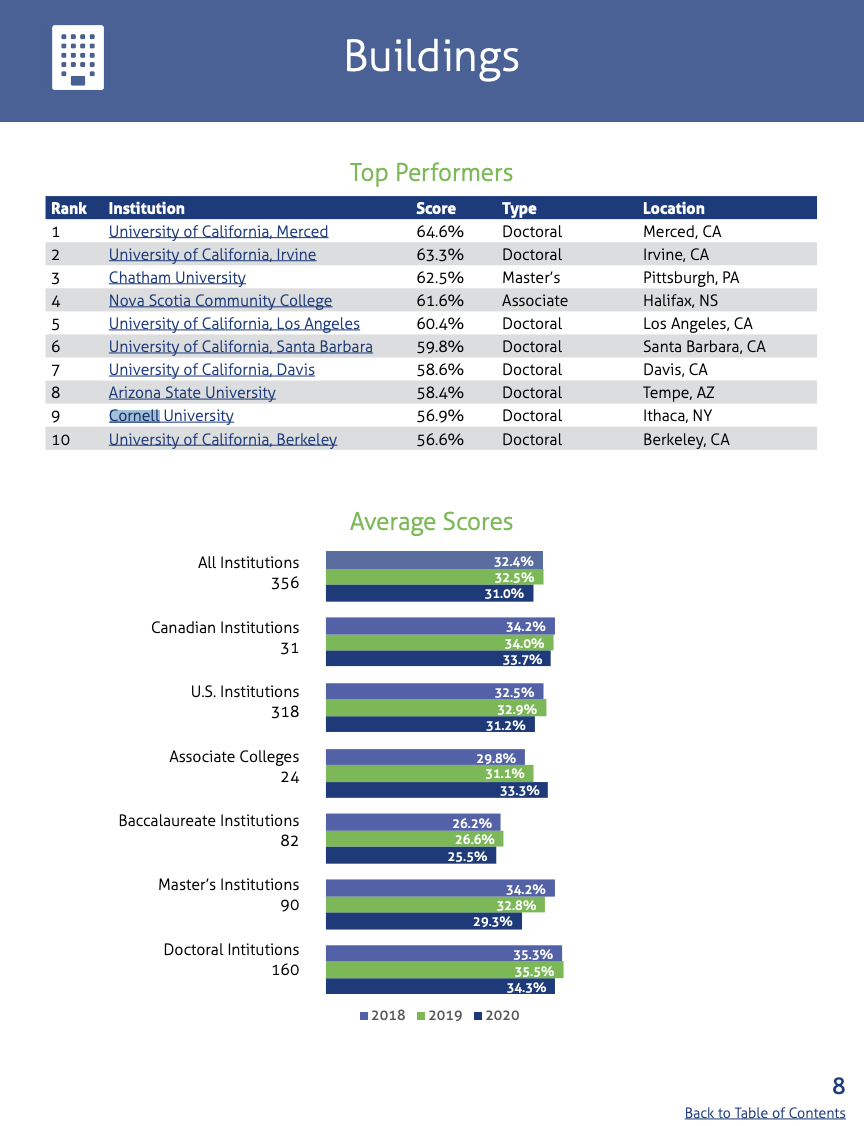
The 2020 AASHE Sustainable Campus Index provides a comparison of top-performing colleges and universities overall, and in seventeen campus sustainability impact areas. The index compares schools in areas like food, buildings & renewable energy, sustainability curriculum, public engagement, and diversity & affordability.
The comparisons are based on data submitted by institutions to the comprehensive Sustainability Tracking, Assessment & Rating System (STARS).
The data from 2020 shows Cornell leading among similar institutions and overall in the United States in campus sustainability. The University was given a perfect score in 45 reporting areas and was highly ranked in several larger category groupings.
Overall Rating: Platinum, Highest Available

In early spring of 2020, Cornell became the first Ivy League institution and the 6th in the world to achieve a STARS Platinum Rating, the highest available after Gold, Silver, Bronze, and Participant levels. At the time of writing, only nine institutions have achieved this accolade.
Cornell previously held the honor of longest-running Gold ranked institution in the nation. The University has submitted a sustainability report to STARS each year since the program launched in 2012.
Cornell also ranked seventh in the nation among all Doctorate granting institutions, trailing after Stanford University, Colorado State, and Arizona State among others.
The 2020 Cornell Sustainability Report dives into the details of how the campus achieved STARS platinum.
Tied for First in Campus Engagement
Cornell tied for first in the nation in sustainability campus engagement.
The institution scored perfect points in this category, 100%, with an average national score of 68.2%. This accolade was achieved alongside Berea College and the University of Connecticut and assessed overall campus engagement in creating sustainability culture and programs. Cornell gained points for programs like the assessment of sustainability culture, outreach campaigns, and green teams and orientation programming, and engagement of both student and staff/faculty communities.
Engaging in sustainability through co-curricular activities allows students, faculty and staff to deepen and apply their understandings of sustainability principles.
Co-curricular sustainability offerings help integrate sustainability into the campus culture and encourage behavior changes that promote sustainability.
Check out some of the engagement programs that garnered top marks for Cornell including Green Teams, Residential Sustainability Leaders, and more.
Second in Public Engagement
It should come as no surprise that Cornell performed well in the area of public engagement.
Cornell ranked second in this area with a score of 97.3%, considerably higher than the national average of 62%.
Public engagement for sustainability rates the University on public service and community volunteering done by students as well as overall campus participation in climate and sustainability partnerships.
Notably, Cornell students contributed over 485,000 community service hours last year and the institution was re-certified with a Carnegie Community Engagement Classification, an elective designation that indicates an institutional commitment to community engagement.
Learn more about Sustainability Partnerships.
Tied for Third in Coordination & Planning
Cornell was one of eight Universities to achieve a perfect score for the coordination and planning of sustainability governance on campus. Cornell has had a participatory sustainability governance committee since the early 2000s, with the most recent iteration called the Sustainable Cornell Council. The institution also receives points for transparency, having a working Climate Action Plan, and participation from different community interest groups in our planning and coordination processes.
Top Ten in Buildings, Curriculum & Research
Cornell is a top ten performer for the category of sustainable buildings. The average score in this category for Doctorate-granting institutions is 36.5%, while Cornell achieved 59.6% of total points.
Cornell performed similarly with Arizona State University and the University of California Berkley, whose similar size and campus scope allow for some similarities to be drawn between the two campuses. The institution lost points in this area for failing to pursue a third-party certified "existing building performance" program. As of 2020, Cornell has ruled that these programs are costly and has struggled to justify paying a consultant or program rather than reintegrating funds back into building performance directly.
The University also ranked sixth overall in the nation for sustainability curriculum development, with a score of 96.1% over the national average of 60.1% in this area, and was tied for second in research along with over 15 other institutions with a score of 100%!
To learn more about curriculum & research opportunities in sustainability at Cornell, visit our Sustainability Classes page.
Advancing next steps
Although the STARS program is useful for benchmarking and highlighting areas of success, it also allows Cornell and other institutions to seek areas of continual improvement.
Some areas for improvement according to STARS including greening University-owned fleet vehicles, increasing purchasing of local and organic foods, and continuing to minimize overall waste, and increase composting and recycling on campus.
To learn more about Cornell's 2020 STARS report, Platinum status, and overall metrics, see the 2020 Cornell Annual Sustainability Report produced by the Campus Sustainability Office.

